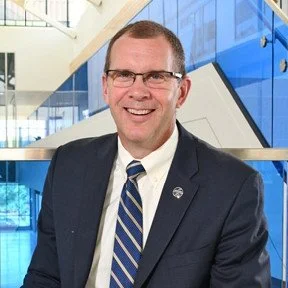The Heartbeat of Leadership: Fostering Meaningful Relationship
John Rathje
Vice President, Information Services and CIO at Kent State University
At the heart of leadership lies the profound ability to channel innate talents towards enriching the lives of others. A true leader, like John Rathje, Vice President, Information Services, and CIO at Kent State University, embodies this essence. It's not merely about personal prowess or skills, but rather the art of leveraging one's gifts to uplift and empower those around them. Leadership isn't a solitary journey; it's a commitment to nurturing the potential within oneself and harnessing it to positively impact the world. John Rathje exemplifies this by not only excelling in his role but by also embracing the responsibility to inspire and elevate others, epitomizing the core ethos of leadership: the altruistic use of one's talents to bless and elevate others.
Leading Through Connection: The Power of Relationships
In the realm of leadership, John Rathje's perspective on relationship matters becomes a guiding light. Rathje, with his experiences, emphasizes that effective leadership transcends mere authority—it thrives on genuine, meaningful relationships. Understanding that leadership is a collaborative endeavor, Rathje underscores the importance of cultivating strong connections with team members, colleagues, and stakeholders. In his approach, relationship matters are not secondary; they are foundational. A leader's ability to foster trust, communicate openly, and empathize with others lies at the core of their effectiveness, creating an environment where collaboration flourishes, innovation thrives, and individuals feel valued.
John Rathje's leadership philosophy intertwines professional expertise with a profound acknowledgment of the human element. He recognizes that relationships aren't just conduits for task completion; they are the bedrock of a healthy organizational culture. Rathje's leadership style reflects the belief that investing time and energy in building authentic connections pays dividends not only in terms of productivity but also in the overall well-being and satisfaction of the individuals within the team. By weaving relationship matters into the fabric of leadership, Rathje exemplifies a holistic approach that not only achieves organizational goals but also enriches the human experience within the workplace
Leadership Triad: Self-Leadership, Team Dynamics, Organizational Vision
John Rathje's approach to leadership seamlessly integrates three distinct yet interconnected categories: leading oneself, leading teams, and leading the entire organization. Rathje firmly believes that effective leadership commences with leading oneself. To him, personal integrity, self-awareness, and continuous growth form the bedrock of leading oneself. Rathje champions the notion that only by embodying integrity and authenticity within oneself can a leader set the tone for trust and credibility essential for leading teams and the larger organization.
When it comes to leading teams, John Rathje advocates for fostering an environment that promotes collaboration, trust, and empowerment. He believes in nurturing a team culture that encourages diverse perspectives, open communication, and shared accountability. Rathje understands that leading teams isn’t just about orchestrating tasks but empowering individuals, leveraging their strengths, and creating a unified vision that propels the collective towards success.
In the realm of leading the organization, Rathje emphasizes the significance of aligning strategic vision with actionable plans. He underscores the need for clear communication of goals, an adaptive approach to change, and a commitment to fostering an organizational culture that mirrors the values it professes. Rathje’s leadership philosophy accentuates that leading the organization isn't about wielding power but about serving the collective mission, continuously aligning actions with values, and inspiring a shared commitment to the organizational vision.
Moving Past Setbacks Towards Success
Embracing a proactive mindset, one that prioritizes problem-solving and innovation over apprehension, is a cornerstone of success. Rather than fixating on the potential pitfalls or anxiously contemplating what could go wrong, redirecting focus towards strategizing how to do things right empowers individuals to approach challenges with resilience and creativity. This mindset shift encourages a forward-thinking approach, allowing for the identification of opportunities, efficient problem resolution, and the cultivation of a culture that thrives on continuous improvement.
In the pursuit of success, failure is not an endpoint but a stepping stone. Acknowledging the possibility of setbacks, the philosophy of failing fast and moving forward underscores the importance of rapid learning and adaptability. Instead of viewing failure as a deterrent, this perspective sees it as an invaluable source of feedback. By swiftly analyzing and extracting lessons from failures, individuals and organizations can iterate on their strategies, refine their approaches, and propel themselves toward success with newfound insights. This approach fosters a culture of resilience, agility, and constant evolution, enabling individuals and teams to navigate challenges confidently and emerge stronger on the other side.
The Ripple Effect of Giving in Leadership
Leadership's true essence often reveals itself in the profound rewards gained by giving to others. As a leader, the act of giving—whether it's knowledge, support, or opportunities—becomes a conduit for exponential growth, not just for oneself but for the entire collective. The joy and fulfillment derived from empowering others, watching them flourish, and aiding their development are immeasurable. It's in these moments of giving that a leader experiences the incredible ripple effect of their actions, witnessing the positive impact spreading far beyond initial expectations. The beauty lies in the realization that the more one gives—be it guidance, trust, or mentorship—the richer their own experience becomes, creating a nurturing ecosystem where everyone thrives.
In leadership, giving goes beyond mere transactions; it becomes the cornerstone of a legacy. Leaders who recognize that their own journey intertwines with the journeys of those they lead realize the profound richness found in selfless giving. By nurturing an environment of mutual support and empowerment, leaders pave the way for collective growth, understanding that their success is intricately tied to the success of the entire team. This culture of generosity fosters a reciprocal cycle of support, resulting in a shared elevation that transcends individual accomplishments.
Conclusion
Bringing together these diverse facets of leadership, it becomes apparent that the essence of effective leadership extends far beyond individual capabilities or hierarchical authority. Instead, it thrives on the interconnected principles of relationships, self-leadership, resilience, and altruism. John Rathje's embodiment of these ideals underscores the symbiotic relationship between personal growth, team dynamics, and organizational vision.
At its core, leadership champions the spirit of giving—be it giving guidance, empowerment, or trust. This philosophy serves as the catalyst for growth, not just within oneself but within the collective unit. Rathje's approach emphasizes that leadership isn't about amassing success in isolation but about fostering an ecosystem where every individual thrives. Through nurturing relationships, championing self-leadership, navigating setbacks with resilience, and embracing the transformative power of giving, leaders like Rathje create legacies that transcend their own accomplishments, enriching the lives of others and defining the true essence of impactful leadership.
Written by Dhan Ababa
“You get so much more by giving to others than you can possibly imagine.”
🎧 Listen To Podcast 🎧



